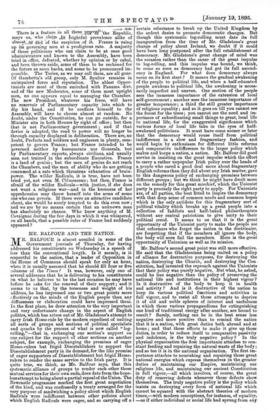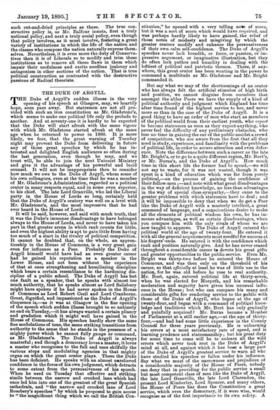MR. BALFOUR AND THE NATION. AI R. BALFOUR is almost assailed
in some of the Government journals of Thursday, for having addressed his constituents on Wednesday in a speech of less than the conventional length. Is it seemly, is it respectful to the nation, that a leader of Opposition in the House of Commons should speak for only an hour, when it is usually assumed that he should fill four or five columns of the Times ? It was, however, only one of several addresses that he is delivering to his constituents on what he believes to be the last occasion he may have before he asks for the renewal of their support ; and it seems to us that, by the terseness and weight of his address, he has impressed one or two great points more ffectively on the minds of the English people than any diffuseness or elaboration could have impressed them. In the first place, he drew attention to the very important and very unfortunate change in the aspect of English polities, rhich has arisen out of Mr. Gladstone's attempt to carry Irish Home-rule by the modern expedient of uniting all sorts of groups and sections of political specialists and quacks by the process of what is now called "log- rolling,"—that is, exchanging one section's support on one subject for the support of other sections on another subject, for example, exchanging the promises of eager Home-rulers but frigid Disestablishers to support the Disestablishment party in its demand, for the like promise of eager supporters of Disestablishment but frigid Home- rulers to render the same service to the Irish party. It is quite true, we think, as Mr. Balfour says, that this systematic alliance of groups to render each other these mutual services for their own ends, does date from the hope- less attempt to bring about a partial repeal of the Union. The Newcastle programme marked the first great negotiation of the kind, and was confessedly a treaty arranged for the very purpose of sandwiching a policy about which English Radicals were indifferent between other policies about which English Radicals were eager, and so carrying off a certain reluctance to break up the -United Kingdom by the ardent desire to promote democratic changes. But though this systematic log-rolling must date its full inauguration from the time of Mr. Gladstone's great change of policy about Ireland, we doubt if it could have been long postponed after the full establishment of democracy. Mr. Gladstone's great change of mind was the occasion rather than the cause of the great impulse to log-rolling, and this impulse was bound, we think, to come so soon as democracy had got its full ascend- ency in England. For what does democracy always mean on its first start ? It means the gradual awakening of the people to political life, and when a half-educated people awakens to political life, the awakening is neces- sarily imperfect and uneven. One section of the people sees the immense importance of the extension of local self-government ; another sees the immense importance of greater temperance ; a third the still greater importance of religious equality ; and so it goes on till you cannot see the forest for the trees ; you cannot see the need and im- portance of subordinating small things to great, local life to national life, for the exaggerated significance which various forms of local life take in the eyes of half- awakened politicians. It must have come sooner or later that the democracy would rouse itself from political indifference in a, slow and fragmentary fashion, and would begin by enthusiasm for different little reforms and comparative indifference to the larger policy which makes and keeps a nation, a nation. Mr. Balfour did good service in insisting on the great impulse which the effort to carry a rather unpopular Irish policy over the heads of a people who cared a good deal more about fragmentary English reforms than they did about any Irish matter, gave to this dangerous policy of exchanging promises between different groups ; but we think he might have dwelt more on the remedy for this great mischief, which the Unionist party is precisely the right party to apply. For Unionists are, of all parties, the best fitted to inspire the democracy with that deep sense of common needs and common hopes which is the only antidote for this fragmentary sort of political vitality which breaks up a great people into a collection of faddists and half-baked philanthropists without any central patriotism to give unity to their political creed. It seems to us that it is the great opportunity of the Unionist party to make the people see that reformers who forget the nation in the doctrinaire, are forgetting that if the members all ignore the body, the body will soon fail the members. Here is the great opportunity of Unionism as well as its mission.
Mr. Balfour's second great point was still more effective. He said that the Gladstonians being united on a policy of alliance for destructive purposes, for destroying the nation, destroying the Church, and destroying the Con stitution, had invented the reproach against the Unionists that their policy was purely negative. But what, he asked, could be less negative than the policy of preserving the national life and institutions in their highest vigour ? Is it destructive of the body to keep it in health and activity ? And is it destructive of the nation to keep its various political functions and activities in full vigour, and to resist all those attempts to deprive it of old and noble spheres of interest and usefulness in which these various propagandisms for extinguishing one kind of traditional energy after another, are bound to result ? Surely, nothing can be in the best sense less negative and more positive than to remind the nation that it is a nation, with great duties both abroad and at home ; and that these efforts to make it give up those duties, in order to reduce itself to comparative passivity and indolence, is the truly negative policy ? In the physical organisation the first importanee attaches to con- stant feeding and repairing the natural waste of the body ; and so too it is in the national organisation. The first im- portance attaches to nourishing and repairing those great national energies which express themselves in the greater duties of maintaining our Empire, maintaining our religious life, and maintaining our ancient Constitution in full vigour,—all which involves, of course, the great duty of removing defects whenever those defects show themselves. The truly negative policy is the policy which insists on destroying every form of national life which cannot be squared with the abstract theories of modern times,—with modern conceptions, for instance, of equality, —as if either individual or social life had sprung from any such cut-and-dried principles as these. The true con- structive policy is, as Mr. Balfour insists, first a truly national policy, and next a truly social policy, even though that policy involves, as it must involve, fostering a great variety of institutions in which the life of the nation and the classes who compose the nation naturally express them- selves. Nevertheless, it is even more the duty of Conserva- tives than it is of Liberals so to modify and trim these institutions as to remove all those flaws in them which impair their usefulness and excite needless jealousy and antagonism in other sections of the nation. That is true political construction as contrasted with the destructive passions of Radical theorists.



































 Previous page
Previous page